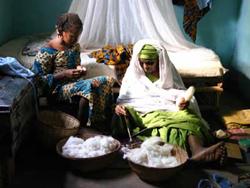Bamako

Bamako is a largely unscripted political film which centers on a trial of the Malian people against the World Bank and IMF. Filmmaker Abderrahmane Sissako chose to shoot the trial in a courtyard that represents his family home in a poorer neighborhood of Mali’s capital city, where he has memories of passionate discussions about Africa. The courtyard in the film is likewise a setting for passionate testimony about the devastating effects of western economic domination over Africa.
Although these testimonies were eloquent, heart felt, informative and true, they weren’t solidified by strong cinematic techniques to inspire an emotional connection or impact on the viewer. The film essentially comprises a series of monologues interspersed with mere visual aids of everyday life, thus lacking any substantial character development or contextual demonstration. Sissako even said that his initial concept for the film was to limit the setting and characters to the trial itself. He decided to “develop the secondary plots because [he] wanted the lives of the people living in the courtyard to echo or interfere with the speeches delivered at the bar,” and he wanted “the sophisticated statements be put into perspective.” However, the “secondary plots” weren’t developed enough to work. Instead of serving as effective emotional context, they don’t go beyond weakly and vaguely representing the issues. Some examples include a married couple having problems because the husband is unable to find work, a man suffering from an illness who cannot afford healthcare, a metaphorical western flick starring Danny Glover that some kids watch on a TV set and other various everyday activities - such as women dying fabrics and children playing. The details and meaning behind these various semi-subplots were so subtle that you might not catch them by merely watching the film once, or even twice.
This could have been quite an effective film if there were a better balance between intellectualizing the issues and poetically demonstrating them. The music was truly beautiful. Mali’s six-century deep musical heritage has become internationally adored and respected, and this could have played more of a role. In fact, watching the trailer or reading the synopsis might lead you to believe this is a film about Melé, a lounge singer with a shockingly beautiful voice, but she is one of the many awkwardly and sparsely placed attempts at providing concrete context for the film’s agenda.